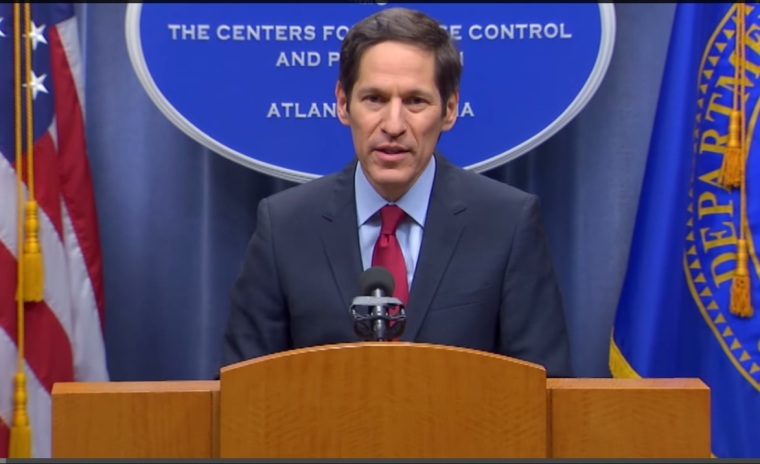Ebola outbreak: CDC confirms 2nd Presbyterian Hospital worker infected

DALLAS (Christian Examiner) – In an Oct. 15 statement, the Centers for Disease Control and Prevention announced "A second healthcare worker at Texas Presbyterian Hospital who provided care for the index patient has tested positive for Ebola."
The CDC reported the new patient was isolated after reporting a fever.
The news comes amid charges from the Dallas hospital's nurses of poor hospital procedures and after confessions by the CDC director of a poor initial CDC response.
The unidentified person is the second to contract the virus from among the members of the team which cared for Thomas Eric Duncan -- the first patient diagnosed in the U.S. with Ebola who subsequently succumbed to the disease despite aggressive treatment, including the use of the experimental drug brincidofovir.
The news of another Ebola case follows reports yesterday about a blood transfusion for Nina Pham, the nurse who is the first person to be infected with Ebola from exposure in the U.S.
Pham received antibody-rich blood from Kent Brantly, a physician and missionary who was infected while treating patients of the Ebola outbreak in Liberia.
Now the CDC concedes the possibility of multiple infections.
"As we have said before, because of our ongoing investigation, it is not unexpected that there would be additional exposures," the CDC said.
The CDC's admission only adds to tensions among hospital workers and the community raised by a number of developments.
This weekend, concurrent with announcing Pham had been infected, Texas Presbyterian also reported it was closing its emergency room, diverting ambulances to other area hospital because of "limitations in staffed capacity." Twelve hours later the hospital reopened the ER only to close it again within half an hour.
Then Monday, Oct. 13, it was learned that instead of limiting exposure of hospital staff, more than 70 health workers had been part of taking care of Duncan.
Texas Health Resources CEO Barclay Berdan led a series of town hall meetings Monday to encourage workers not to lose sight of "the compassion and selflessness" Pham and others demonstrated in caring for "others infected with this disease," and reassured staff members the hospital was "working on all levels with the CDC" to ensure precautions against transmitting the disease."
But during a press conference Tuesday, CDC Director Thomas Frieden admitted missed opportunities to prevent the virus' spread.
"We could've sent a more robust hospital infection control team and been more hands-on with the hospital from day one about exactly how this should be managed," he said.
He also expressed other concerns about CDC's handling of the cases, saying he wished he had put an Ebola response team on the ground when the patient was diagnosed.
"That might have prevented this infection," he said referring to Pham.
An unknown number of nurses at Texas Presbyterian now are claiming they received poor training and the hospital took inadequate safety precautions in the response and initial handling of the first case.
The nurses contacted National Nurses United, the nation's largest nurses' union—but does not represent Texas Presbyterian nurses—to make their complaints public, anonymously.
Executive Director RoseAnn DeMoro said the unnamed nurses listed such concerns as lack of protective clothing and equipment during the first few days of treating Duncan, mounting hazardous waste that awaited disposal for days, and lack of consistent safety protocols.
They also pointed out the failure to immediately isolate Duncan may have needlessly exposed patients and health care workers.
Duncan traveled to the U.S. on Sept. 20 from Liberia. Four days after arriving he went to the emergency room at Texas Health Presbyterian Hospital and was diagnosed of having a possible sinus infection and discharged with a prescription for antibiotics. He returned to the Sept. 26 and was admitted, but hospital supervisors did not isolate him until Sept. 28 at which time he was tested for Ebola.
During the Tuesday news conference, Frieden detailed the number of people who might have been exposed to the Ebola virus and said the CDC is monitoring them.
-- 48 persons were possibly exposed by Duncan prior to his hospitalization
-- at least 76 Texas Presbyterian health care workers might have come into contact with Duncan or his blood and are being monitored now
-- one individual was exposed to Pham while she was contagious and before she was isolated
In its statement today the CDC offered reassurance that containment is possible, saying "wider spread in the community can be prevented with proper public health measures including ongoing contact tracing, health monitoring among those known to have been in contact with the index patient and immediate isolations if symptoms develop."